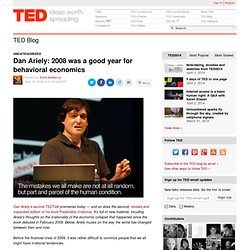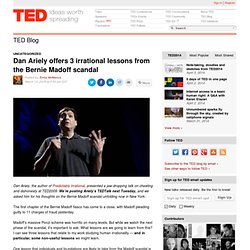

Absolute beginners: behavioural economics and human happiness. Behavioural Economics. Homo Economicus? Behavioural Economics Applied. Behavioural Investing: A Practitioners Guide to Applying Behavioural Finance. Kahneman & Tversky.
Robert Shiller. Psychology/Sentiment. Psychology. The Psychology and Judgment of Decision Making. Dan Ariely: 2008 was a good year for behavioral economics. Dan Ariely’s second TEDTalk premieres today — and so does the second, revised and expanded edition of his book Predictably Irrational.

It’s full of new material, incuding Ariely’s thoughts on the irrationality of the economic collapse that happened since the book debuted in February 2008. Below, Ariely muses on the way the world has changed between then and now: Before the financial crisis of 2008, it was rather difficult to convince people that we all might have irrational tendencies. For example, after I gave a presentation at a conference, a fellow I’ll call Mr. Logic (a composite of many people I have debated with over the years) buttonholed me. Given these kinds of responses, I was often left scratching my head, wondering why so many smart people are convinced that irrationality disappears when it comes to important decisions about money.
As I was asking myself these questions, something very big happened. Dan Ariely asks, Are we in control of our own decisions? Dan Ariely offers 3 irrational lessons from the Bernie Madoff scandal. Dan Ariely, the author of Predictably Irrational, presented a jaw-dropping talk on cheating and dishonesty at TED2009.

We’re posting Ariely’s TEDTalk next Tuesday, and we asked him for his thoughts on the Bernie Madoff scandal unfolding now in New York: The first chapter of the Bernie Madoff fiasco has come to a close, with Madoff pleading guilty to 11 charges of fraud yesterday. Madoff’s massive Ponzi scheme was horrific on many levels. But while we watch the next phase of the scandal, it’s important to ask: What lessons are we going to learn from this? I can see three lessons that relate to my work studying human irrationality — and in particular, some non-useful lessons we might learn. One lesson that individuals and foundations are likely to take from the Madoff scandal is that in addition to diversifying their portfolio across several investments (stock, bonds, equity, cash), they also need to diversify their investments among several advisors.
Dan Ariely on our buggy moral code. Herd Behaviour. AS & A2 Economics - Intensive Exam Coaching & Revision Workshops: Book Now!

Stratford | Fulham | Bristol | Birmingham | Gateshead | Leeds | Manchester Monday, November 28, 2011 PrintEmailTweet This! Save to Favorites Professor Andrew Oswald from the University of Warwick delivered a pitch-perfect lecture on the significance of herd behaviour in his talk at the LSE tonight. Why has the Economics discipline been so tawdry in understanding better some of the Biology and Psychology behind the behaviour of groups? Herding is associated with behavioural traits such as copying, clustering, imitating and conformity. Paul Ormerod makes some revealing and instructive comments on copying in this excellent video from a recent RSA talk.
One of Oswald’s arguments is that in the majority of circumstances, our natural, perhaps sub-conscious instincts to herd serve us well. It turns out that your relative position in the crowd matters a lot! 14.127 Behavioral Economics and Finance, Spring 2004. That’s My Stock You Just Trashed. I am constantly amazed how individuals react to articles written about stocks they maintain in their portfolio.

Recently, much discussion has occurred on this website and across the internet on the purchase of Skype by Microsoft (MSFT). Those that hold Microsoft are certain that it is a great buy and a great product that will allow the company to expand. Those of us that don’t, feel that it was too expensive of a price to pay and that it will have no great long-term effect on the company’s growth prospects. Both sides are both passionate and certain of their position and have little tolerance for the opposing viewpoint as evidenced by the responses below each article. Kenyan Sex Markets and Behavioral Finance. Jonathan Robinson and Ethan Yeh A free, unpublished version of the paper can be found here.

The published version can be found here (you have to be a member of the AEA). Abstract: “Though formal and informal sex work has long been identified as crucial for the spread of HIV/AIDS, the nature of the sex-for-money market remains poorly understood. Using a unique panel dataset constructed from 192 self-reported diaries, we find that women who engage in transactional sex substantially increase their supply of risky, better compensated sex to cope with unexpected health shocks, particularly the illness of another household member. These behavioral responses entail significant health risks for these women and their partners, and suggest that these women are unable to cope with risk through other consumption smoothing mechanisms.” Robert Shiller on Behavioral Economics. In the past twenty years there has been a revolution in economics with the study not of how people would behave if they were perfectly rational, but of how they actually behave.

At the vanguard of this movement is Robert Shiller of Yale University. He sits down with Nigel Warburton in this episode of the Social Science Bites podcast. Social Science Bites is made in association with SAGE. Click HERE to download a PDF transcript of this conversation. The full text also appears below. To directly download this podcast, right click HERE and “Save Link As.” Social Science Bites is made in association with SAGE. David Edmonds: OK,you’ve got a choice, buy this plastic alarm clock right next to where you are standing for $28 or walk ten blocks and buy it in another shop for half price; $14. Nigel Warburton: Robert Shiller welcome to Social Science Bites. Your Decisions Are Irrational.